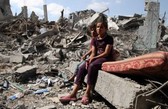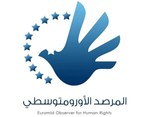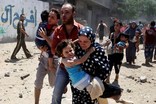22 dec 2014

An official European Parliament
delegation has visited the Gaza Strip after the recent Israeli onslaught
on the blockaded and besieged area, and says that Israel has committed
genocide against defenseless Palestinians.
According to the PNN, a delegation including 13 members of the European Parliament, has called on the EU to break diplomatic ties with Israel and implement sanctions against Tel Aviv because of war crimes it has committed against the Palestinian people.
"I don't think it is too strong a word, not when you think of how genocide is described; it's described as the partial or the whole destruction of people; and what we are seeing happen in Gaza, in Palestine, is the destruction of Palestinians," Martina Anderson, an Irish member of the European Parliament, told Press TV.
The delegation, which has just returned to the Belgian capital of Brussels, from the Middle East, has also accused the West of turning a blind eye to Israel's crimes against Palestinians.
Related: ITUC Recognizes Palestine, Calls For Reconstruction Of Gaza
Irish Parliament Calls for Recognition of Palestinian Statehood
The officials also accused Tel Aviv of continuing to break international law by engaging in land grabs to build settlements in Palestine.
Without putting an end to the settlement policy of the Tel Aviv regime, it is not possible to "have peace not only in Palestine but also in the region," Neoklis Silikyotis, a Cypriot member of the European Parliament, said.
Israel's recent military invasion on Gaza ended in August of 2014, with an Egyptian-brokered truce, which took effect after negotiations in the Egyptian capital, Cairo.
Some 2,140 Palestinians, mostly civilians, including women, children and elderly, were killed in the 50 days of the Israeli onslaught on Gaza. Another 11,000 others were injured and over 100,000 left homeless.
Israel says 72 Israelis were also killed, but Hamas puts the number at much higher.
According to the PNN, a delegation including 13 members of the European Parliament, has called on the EU to break diplomatic ties with Israel and implement sanctions against Tel Aviv because of war crimes it has committed against the Palestinian people.
"I don't think it is too strong a word, not when you think of how genocide is described; it's described as the partial or the whole destruction of people; and what we are seeing happen in Gaza, in Palestine, is the destruction of Palestinians," Martina Anderson, an Irish member of the European Parliament, told Press TV.
The delegation, which has just returned to the Belgian capital of Brussels, from the Middle East, has also accused the West of turning a blind eye to Israel's crimes against Palestinians.
Related: ITUC Recognizes Palestine, Calls For Reconstruction Of Gaza
Irish Parliament Calls for Recognition of Palestinian Statehood
The officials also accused Tel Aviv of continuing to break international law by engaging in land grabs to build settlements in Palestine.
Without putting an end to the settlement policy of the Tel Aviv regime, it is not possible to "have peace not only in Palestine but also in the region," Neoklis Silikyotis, a Cypriot member of the European Parliament, said.
Israel's recent military invasion on Gaza ended in August of 2014, with an Egyptian-brokered truce, which took effect after negotiations in the Egyptian capital, Cairo.
Some 2,140 Palestinians, mostly civilians, including women, children and elderly, were killed in the 50 days of the Israeli onslaught on Gaza. Another 11,000 others were injured and over 100,000 left homeless.
Israel says 72 Israelis were also killed, but Hamas puts the number at much higher.
15 dec 2014

The Euro-Mid Observer for Human Rights hailed Switzerland for its intention to host a meeting of signatory states to the Geneva conventions to discuss Israel's violations in the occupied Palestinian territories.
The Euro-Mid observer considered the intended meeting, slated to be held on 17 December, an important step to pressure Israel to respect its obligations as an occupying power under the rules of the international humanitarian law and expressed hope that it would yield effective results.
"We were not surprised by the Israeli decision not to attend the meeting and its call on the member states to boycott it because Israel knows more than anyone the extent of its violation of the Geneva conventions, especially since it has emerged from a harsh war in which it dealt with the civilians in the Gaza Strip in an inhumane way, killing more than 2,100 persons during 50 days," the human rights group underlined.
The rights group appealed to the participating member countries, especially the European signatories, to effectively work on developing mechanisms that could force Israel to abide by the Geneva conventions in the occupied territories and monitor its respect for the international law.
It also called for activating the principle of universal jurisdiction that allows the courts of those states to claim criminal jurisdiction over an accused person regardless of where he or she committed their crime or his or her nationality as long as their country is a party to the conventions.
The Euro-Mid observer considered the intended meeting, slated to be held on 17 December, an important step to pressure Israel to respect its obligations as an occupying power under the rules of the international humanitarian law and expressed hope that it would yield effective results.
"We were not surprised by the Israeli decision not to attend the meeting and its call on the member states to boycott it because Israel knows more than anyone the extent of its violation of the Geneva conventions, especially since it has emerged from a harsh war in which it dealt with the civilians in the Gaza Strip in an inhumane way, killing more than 2,100 persons during 50 days," the human rights group underlined.
The rights group appealed to the participating member countries, especially the European signatories, to effectively work on developing mechanisms that could force Israel to abide by the Geneva conventions in the occupied territories and monitor its respect for the international law.
It also called for activating the principle of universal jurisdiction that allows the courts of those states to claim criminal jurisdiction over an accused person regardless of where he or she committed their crime or his or her nationality as long as their country is a party to the conventions.
13 dec 2014

The ministry of Agriculture in Gaza voiced firm rebuff to an Israeli request to meet with Palestinian farmers over the issue of toxic pesticides sprayed on their crops by Israeli warplanes last month.
The ministry had asked the Israeli occupation authorities (IOA) to identify the nature of the substance sprayed over Palestinian farmlands in mid-November near the security fence, adjacent to southern Gaza, A PIC correspondent quoted government sources as reporting.
The IOA laid down a set of stipulations, weeks after the request, saying the probe could only be carried out if samples of damaged crops are taken as case studies and Palestinian farmers are interviewed.
The Palestinian ministry rejected the appeal for fear of the security repercussions resulting from Israeli interrogation procedures.
A drove of Israeli warplanes had sprayed toxic herbicides over large areas of Palestinians’ crops and farmlands, for three days, that penetrated as deep as 1500 meters of the targeted lands located west of the border fence separating Gaza and 1948 Occupied Palestine.
More than 600 dunums of Palestinian cultivated land lots have sustained considerable damage in the process.
The ministry had asked the Israeli occupation authorities (IOA) to identify the nature of the substance sprayed over Palestinian farmlands in mid-November near the security fence, adjacent to southern Gaza, A PIC correspondent quoted government sources as reporting.
The IOA laid down a set of stipulations, weeks after the request, saying the probe could only be carried out if samples of damaged crops are taken as case studies and Palestinian farmers are interviewed.
The Palestinian ministry rejected the appeal for fear of the security repercussions resulting from Israeli interrogation procedures.
A drove of Israeli warplanes had sprayed toxic herbicides over large areas of Palestinians’ crops and farmlands, for three days, that penetrated as deep as 1500 meters of the targeted lands located west of the border fence separating Gaza and 1948 Occupied Palestine.
More than 600 dunums of Palestinian cultivated land lots have sustained considerable damage in the process.
10 dec 2014

Adama Dieng, the United Nations Secretary-General's Special Adviser on the Prevention of Genocide, condemned Israel for having committed crimes against humanity and genocides against the Palestinian people.
“What happened in Sabra and Shatila is a crime against humanity and all acts of mass-execution are crimes against humanity,” Adama Dieng said as he briefed reporters at UN Headquarters in New York.
The Special Adviser on the Prevention of Genocide has been appointed by the UN General-Secretary to raise awareness of the causes and dynamics of genocide, war crimes, ethnic cleansing and crimes against humanity.
At least 5,000 Palestinian refugees were mass-murdered in the notorious Sabra and Shatila massacre perpetrated in Lebanon by the Israeli occupation forces (IOF) and Lebanese Phalange militias in September 1982.
The UN adviser voiced his belief that the latest operations in Gaza might have led to war crimes emanating from the disproportionate use of violence by the IOF.
He said preliminary findings and probes currently conducted by the UN Human Rights Council into the offensive are expected to be released by next March.
At least 2,000 Palestinians, including 500 children, were killed while more than 11,000 were left wounded in the latest Israeli offensive on the Gaza Strip launched on July 8.
“What happened in Sabra and Shatila is a crime against humanity and all acts of mass-execution are crimes against humanity,” Adama Dieng said as he briefed reporters at UN Headquarters in New York.
The Special Adviser on the Prevention of Genocide has been appointed by the UN General-Secretary to raise awareness of the causes and dynamics of genocide, war crimes, ethnic cleansing and crimes against humanity.
At least 5,000 Palestinian refugees were mass-murdered in the notorious Sabra and Shatila massacre perpetrated in Lebanon by the Israeli occupation forces (IOF) and Lebanese Phalange militias in September 1982.
The UN adviser voiced his belief that the latest operations in Gaza might have led to war crimes emanating from the disproportionate use of violence by the IOF.
He said preliminary findings and probes currently conducted by the UN Human Rights Council into the offensive are expected to be released by next March.
At least 2,000 Palestinians, including 500 children, were killed while more than 11,000 were left wounded in the latest Israeli offensive on the Gaza Strip launched on July 8.

Palestine became an official observer at the Hague's International Criminal Court, on Monday, according to UN envoy Riyad Mansour.
The Palestinian official said the move would strengthen possibilities for Palestinian statehood, Ma'an News Agency reported.
Mr. Mansour additionally stated that Palestine's new status at the ICC was "another victory for Palestinians at the international level, bringing them closer to restoring their rights, and opening the door wide to drag leaders of the Israeli occupation to the dock of this court, so the souls of the victims can finally rest in peace."
He said that Palestine was now moving in the direction of becoming full members of the ICC.
Palestine's recognition comes as a procedural move at the opening session of the Assembly of States Parties to the Rome Statute, according to an Associate Press report.
The PLO had, in 2009, appealed to the ICC's prosecutor's office for official investigation into war crimes and crimes against humanity committed by the Israeli military in Gaza.
There has so far been no probe, according to Ma'an, as Palestine is not an ICC member state and its status as a state is uncertain within some international circles.
However, the PLO obtained the status of observer state at the United Nations, in late November of 2012, opening the door for an ICC investigation.
The Palestinian official said the move would strengthen possibilities for Palestinian statehood, Ma'an News Agency reported.
Mr. Mansour additionally stated that Palestine's new status at the ICC was "another victory for Palestinians at the international level, bringing them closer to restoring their rights, and opening the door wide to drag leaders of the Israeli occupation to the dock of this court, so the souls of the victims can finally rest in peace."
He said that Palestine was now moving in the direction of becoming full members of the ICC.
Palestine's recognition comes as a procedural move at the opening session of the Assembly of States Parties to the Rome Statute, according to an Associate Press report.
The PLO had, in 2009, appealed to the ICC's prosecutor's office for official investigation into war crimes and crimes against humanity committed by the Israeli military in Gaza.
There has so far been no probe, according to Ma'an, as Palestine is not an ICC member state and its status as a state is uncertain within some international circles.
However, the PLO obtained the status of observer state at the United Nations, in late November of 2012, opening the door for an ICC investigation.
